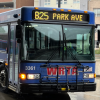The detention of a 10-year-old girl with cerebral palsy in South Texas last month for immigration violations spotlights a harsh reality of the borderlands. Undocumented immigrants who live north of the border, but south of a string of Border Patrol checkpoints, say they feel trapped. They fear seeking specialized medical care or visiting family. Some call it la jaula, which is Spanish for "the cage"; others call it la isla, "the island."
The federal government maintains 34 highway checkpoints within 100 miles of the border as a second line of defense against illegal immigration. At the checkpoint on Interstate 35, located 30 miles north of Laredo, a Border Patrol agent questions every driver who stops in his lane, looking for smuggled drugs and people.
"Good afternoon, could you state your citizenship? Anybody else in the vehicle?" he says, over the din and exhaust of idling freight trucks.
Because they fear getting caught at these checkpoints, unauthorized immigrants can live their whole lives in this strip of thornbrush and desert along the U.S.-Mexico border. They miss graduations and funerals; they hunker down instead of evacuating for hurricanes.
The undocumented parents of Rosa Maria Hernandez, the little girl with cerebral palsy, were fearful as well. They didn't accompany her through the checkpoint to a hospital 2 1/2 hours away; instead they sent her with an adult cousin who's a U.S. citizen — but the Border Patrol apprehended her anyway.
"People who live here in Laredo are really living in an island. You can't go anywhere north, south, east, west without passing through some kind of checkpoint that questions your citizenship," says Mike Smith, a Methodist pastor and director of a local community center.
For people trapped in the cage, on the island, the lack of specialized health care is the biggest challenge. Laredo — an isolated city of 235,000 people — has limited medical facilities.
Inocencia Garcia never, ever leaves Laredo — not for vacations, not for medical care. The wizened, soft-spoken woman has lived in Laredo — illegally — for 26 of her 67 years. Her U.S.-born daughter is a Deferred Action for Childhood Arrivals recipient and public school teacher.
Garcia says she has suffered for several years from a chronic bladder infection that resists antibiotics. She's had to stop working as a housekeeper. If she's too active she bleeds.
Smith has tried to help. "I have a doctor that's ready to see her and treat her in San Antonio at no cost, but she can't get there," he says.
The Border Patrol says its policy is that if an undocumented immigrant is in an ambulance at the checkpoint, agents allow him or her to continue on to the hospital and then hand the person a Notice To Appear in immigration court.
That's what happened to Josefina Pena, 60, another undocumented housekeeper and Laredo resident.
"My doctor told me I had blockage in my veins and I was about to have a heart attack. I needed emergency treatment," she says, referring to coronary angioplasty. In April, she left Laredo for University Hospital in San Antonio, but first her ambulance had to pass the checkpoint.
"I was lying in the back of the ambulance," she continues, "when an agent opened the door and asked me for my documents. I told him I didn't have any. He closed the door and he let us go through. Then when we got to San Antonio, the Border Patrol was there waiting for me."
In her hospital bed, Pena was put under arrest. Agents waited until after the procedure, then transported her to a federal detention facility in Laredo where she spent the night. She was released the next day.
"It used to never be a problem," says her attorney, Ricardo DeAnda, who has practiced law in Laredo for 30 years. "Doctors could safely say [to immigration officials], 'This is an emergency. This patient needs to go to San Antonio' and the Border Patrol would not intervene."
He adds, "What's happening now is they're following the ambulance to put people in detention."
Since the highly publicized story of Rosa Maria, it's not hard to find similar checkpoint cases.
Nelly Vielma, an immigration lawyer and City Council member in Laredo, has an undocumented client who had to go to San Antonio in February to have a brain tumor removed. Same deal: Agents stopped the ambulance at the checkpoint, followed the 55-year-old woman to the hospital, and served her deportation orders before letting the operation proceed.
"We've noticed more detentions. We've noticed less discretion, cases where we thought, OK, this was a sure thing, they will exercise prosecutorial discretion. They don't," says Vielma.
Vielma says she thinks Rosa Maria's case had to make news "so people can pay attention to the immigration laws that are becoming so extreme."
The Border Patrol disputes that it handles medical emergencies at checkpoints any differently these days.
"It's 100 percent inspection," says Gabriel Acosta, assistant chief patrol agent in the Laredo Sector. "Nothing has changed. In the 20 years I've been in the Border Patrol we're doing exactly the same thing."
Copyright 2017 NPR. To see more, visit http://www.npr.org/ .




